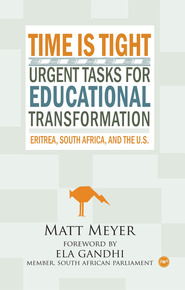Time is Tight: Urgent Tasks for Educational Transformation in Eritrea, South Africa, and the United States

Transformations
Time is Tight: Urgent Tasks for Educational Transformation
in Eritrea, South Africa, and the United States
By Matt Meyer
Africa World Press, 2006
$24.95; 222 pages, paperback
We all know many problems with education in the United States – police and violence in the schools, drop-out rates, the standardized test score gap between students of European and Asian descent and those of African, Latino and Native American backgrounds, a Eurocentric curriculum. In his book Time is Tight: Urgent Tasks for Educational Transformation, Matt Meyer, former chair and current member of the War Resisters League’s National Committee, addresses these and other issues by looking to liberation struggles and the immediate post-independence periods in Eritrea and South Africa.
Meyer’s investigation counters two powerful ideological tenets — that education in the so-called developed world is the worldwide model and that it is the industrialized world that offers help to less developed countries rather than the other way around or an exchange among equals.
Meyers book makes reference to U.S. progressive school reformers and discusses how their ideas might improve education in both the United States and Africa. However, this review will concentrate on his investigation of educational experiences in Africa and their possible contribution to U.S. school reform.
The liberation struggles in South Africa and Eritrea both viewed education as essential. In Eritrea, literacy was seen as fundamental to political progress, a basic human right, and an important step toward meeting human needs. Much energy went into developing schools during the pre-independence period.
In South Africa schools were centers of resistance, for example opposition to the requirement that subjects be taught in Afrikaans, a language not recognized outside the Afrikaaners’ own ethnic circles. Meyer reminds us that schools generally reflect the values of the state that controls them and thus become sites of struggle as the authority of the state is questioned.
Respect for local languages and cultures was important in these struggles for independence and development. In Eritrea, multilinguallism is a key principle. Tigrigna and other local languages, Arabic, English, and Italian are all valued, as are diverse cultures. Meyer notes that radical Brazilian educator Paulo Freire called literacy a form of cultural production that gives people a sense of their worth and empowers them to transform oppressive conditions.
This contrasts with the uphill struggle for bilingual education in the United States and the devaluing of children’s home culture in most of our schools, leading to “subtractive education”: First-generation Third World students often do better than second-generation students, who have been pressured to give up their home language and culture. Meyer sees Eritrea’s multilingualism as an important educational and political principle and he points out that multilingual children have a cognitive flexibility that monolingual children often lack.
We are all learning together and we are all teachers. Translated into education, this means respect and caring for the whole personhood of each of us and particularly the children. Such a perspective is far removed from the student-as-consumer-and-test-score-statistic approach so prevalent in U.S. schools today.
Meyer quotes Julius Nyerere, the first president of Tanzania, whose writings on education have been widely used in Africa: “The purpose of education is to transmit from one generation to the next the accumulated wisdom and knowledge of society and to prepare the young for their future membership in the society and their active participation in its maintenance and development.” The goals are not to create an obedient and reliable labor force, to select the “best and the brightest” for positions of status and wealth, or to separate an elite from the underclass! The Eritreans call on those receiving formal education not to be afraid to “dirty their hands” with physical labor.
In South Africa there has been a search for the “common good” across diverse groups. Ubuntu sees one person’s humanity as inextricably linked to others, reflected in the popular proverb “I am because we are; we are because I am.” Communality, human dignity, unity, pluralism, and multi-dimensionality are both means and goals for educational work, according to Meyer.
Meyer believes “time is tight” in the United States because we are more a pressure-cooker than a melting-pot society, and the pressure is building. Students are bored by the drill-and-kill (any interest in learning) approach to high-stakes tests that dominates the curriculum. He agrees with Freire, who suggests that “maybe so many young people emerge from your school systems illiterate because they are resisting, refusing to read the world the way they’re being taught it.” Meyer calls on educators building transformative schools to understand students who won’t give respect until they get it an who only pay attention if they find what’s being taught relevant.
How do we find for our own educational struggles the energy, passion, and commitment found in the South African and Eritrean liberation movements? Meyer calls on us to begin with personal work – to unlearn the old racist, elitist, Eurocentric methods of schooling, where schools are sorting mechanisms for a hierarchical society. We need to join with teachers, students, families, and community leaders and elders for support and guidance as we engage in this difficult and sometimes painful work. In South Africa the personal narratives and sharing int he Truth and Reconciliation Commission process are seen as a way for educators to become learners ready to participate in healing at the personal, classroom, and institutional levels. We may need a similar process here to jumpstart our own revolutionary process of fundamental educational change. Meyer’s book points us in that direction.
